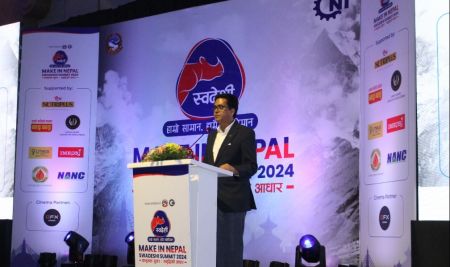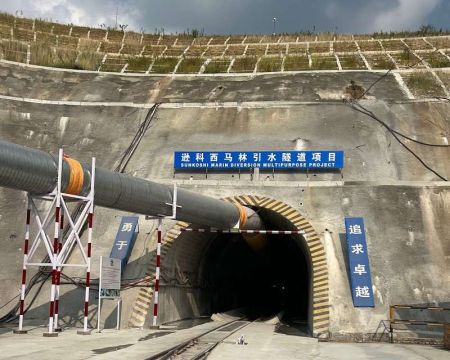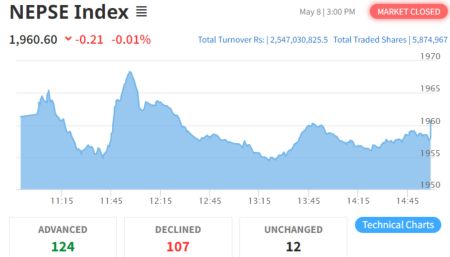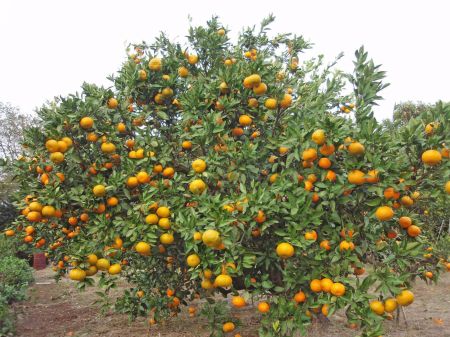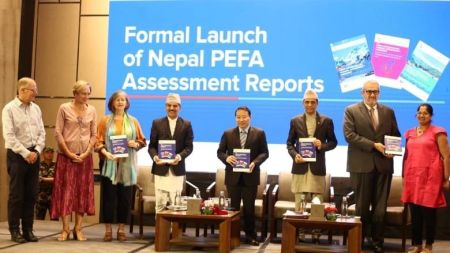Urmila Shrestha is the CEO of Salt Trading Corporation (STC). Shrestha, who began her career at STC as a trainee, also holds the positions of Vice President at the Nepal Chamber of Commerce and President of the Nepal Women's Chamber. Madan Lamsal of New Business Age talked to Shrestha on a wide range of issues related to trading and import business of the STC. Excerpts:
Please tell us why STC was established and what it is doing now?
STC was established on Bhadra 27, 2020 BS. It was initiated by the government and involved investment from firms engaged in the salt trade. The government holds a 22.45% stake in the company, while the remaining 77.55% is held by the general public. This makes it a model of public-private partnership in Nepal.
The government has granted permission to STC for the import and distribution of iodised salt across the country. We are required to maintain a stock that can meet the demand for salt for a minimum of six months. This is a significant task considering that salt production in our source market, India, is only possible for three or four months. Typically, we have salt procured from 11 months to a year ago in our inventory. To maintain this stock, we need to invest at least Rs 1-1.5 billion.
In the past, we used to import sugar at subsidised rates to intervene in market prices. However, for the past three years, we have not imported sugar due to strong lobbying by domestic sugar producers, who claim that domestic production can meet the market demand. We also import chemical fertilisers, which are essential for agriculture. Urea, DAP, and potash are subsidised by the government, while single super phosphate (SSP) and ammonium sulphate are not subsidised. Additionally, we import products such as ghee, lentils, rice, legumes, edible oil, flours, etc. We regularly import newsprints for the media industry in the country, and we also import other paper products as per demand.
As our founders committed not to engage in the trade of liquors and tobacco products, we do not procure or distribute such items. However, apart from these products, we can import and distribute any other goods in the Nepali market.
Is STC involved in farm-based ventures?
In addition to our import and distribution operations, STC is actively involved in the production and processing of wheat seeds. We are the largest producers of wheat seeds in Nepal after the government entities. We engage in contract farming to cultivate wheat seeds and also purchase wheat grown by farmers. At our facility located in the Hetauda Industrial District, we process the purchased wheat and distribute refined flour in the market. Furthermore, STC has made investments in Morang Sugar Mills. This sugar mill is focused on cultivating an improved variety of sugarcane, making us one of the largest sugarcane producers in the country.
We have heard many bitter stories from sugarcane farmers. Can you elaborate on your sugar business?
In the past, there used to be an informal agreement between farmers and mill owners under which payments to be received by farmers would pile up for two years. For example, after farmers supply sugarcane to the mill in the third year, they would get payment for the first year. When farmers took to the streets to protest non-payment of dues by the mills, STC actively lobbied with relevant government agencies to address the issue. The Ministry of Industry, Commerce, and Supplies intervened, pressuring mills to clear pending dues. Currently, there is only one year's payment pending which, I think, is within the normal payment cycle. However, there are still some mills that have not cleared their pending dues to farmers despite the government’s instruction. I have felt that new players in sugar production are comparatively more serious toward farmers.
Although STC owns a sugar mill, it has not been able to produce sugar because the plant and machinery at Morang Sugar Mills are outdated. We are in an internal discussion on whether to bring new plants. STC has already made significant investments in mechanisation for sugarcane farming. I think the government should provide subsidies to farmers for mechanisation, focusing on larger equipment like harvesters and trailers. Subsidies on small equipment may not yield the desired results.
Please tell us about other ventures of STC?
One of our ventures, Nepal Vegetable Ghee Industries in Hetauda, had remained shut for a long time. However, we have resumed production by utilising the plant to produce mustard oil. This is our efforts to encourage mustard farmers. The import of SAP fertilisers in Nepal has also contributed to the growth of mustard production in the country. We maintain a database of mustard farmers who procure SAP from us. We engage in negotiations with them and purchase their mustard seeds. However, we have not considered contract farming for mustard seeds yet.
Likewise, the government has begun discussion to resume production at Gorakhkali Rubber Udyog. Should production resume, it will further expand our portfolio as we are the largest shareholder in Gorakhkali Rubber after the government.
STC has also ventured into the construction of pre-engineered houses. Many people are not aware that top layer of soil is used in bricks, and it takes centuries to form 1 cm of such soil. To offer an alternative to traditional brick construction, we have started producing pre-engineered houses in Nepal. These houses utilise steel structures, concrete blocks, and thermo seals. We have built a model house in Dahachowk so that people can see for themselves before making any decision. Although such houses are popular in foreign countries, this project has not gained significant momentum. It is challenging to change people's perception overnight.
We have also made investments in National Finance Company Ltd which later merged with Narayani Finance. Currently, Narayani Finance has been acquired by Sunrise Bank Ltd, which means we also hold stakes in Sunrise Bank Ltd. Additionally, we had stakes in Sagarmatha Insurance Ltd which has now become Salico Insurance following a merger with Lumbini Insurance.
In addition to our diverse ventures, we are also involved in the distribution of soap in the domestic market. We ventured into this business with the intention of promoting hand hygiene among farmers, emphasising the importance of washing hands after applying fertilisers on their land.
Can you please tell us about the workforce and turnover of STC?
We maintain a workforce of approximately 500 individuals, which includes both permanent and temporary workers. Many more work with us on contracts or a daily wage basis. Additionally, we employ over 300 individuals specifically for packing salt and other food products. Notably, around 90% of this workforce comprises women. STC has received recognition from the Women Commission for its commitment to prioritising women in its workforce.
Regarding our financial performance, our average annual turnover hovers above Rs 11 billion. However, due to the impact of COVID-19, our turnover dropped to around Rs 8 billion in the last fiscal year. Nevertheless, we remain optimistic about reaching pre-COVID levels in the current fiscal year.
Shortage of chemical fertilisers is a long-running problem in Nepal. How is the situation this year?
Nepal needs approximately 500,000 tonnes of chemical fertilisers annually. Out of the total subsidies provided by the government on chemical fertilisers, Krishi Samagri Company Ltd receives 70% while we get the remaining 30%. This indicates that we are responsible for importing 30% of the total chemical fertilisers imported into the country. For the current fiscal year, we have already completed all the necessary procurements. Furthermore, the government has granted us permission to procure an additional 92,000 tonnes of chemical fertilisers. The majority of these shipments have already arrived, while some are currently being transported into the country. Presently, we have approximately 70,000 tonnes of chemical fertilisers in stock, including the consignment being shipped to Nepal. Similarly, Krishi Samagri Company Ltd also maintains its own stock of fertilisers. Therefore, we do not anticipate a shortage of chemical fertilisers until mid-September. New shipments for the upcoming fiscal year will start arriving in the country by that time.
How do you take care of distribution of chemical fertilisers at the local level?
There is a fixed quota for the distribution of chemical fertilisers across all districts. Previously, a district-level committee was responsible for making recommendations regarding the distribution. However, the authority has now been decentralised to the local governments. We distribute chemical fertilisers based on the recommendations of the local governments.
In terms of logistics, since fertilisers are transported to the Nepal border in railway rakes, most of the imports are carried out through an inland container depot in Sirsiya or the Raxaul customs office. Trucks transport the shipments to Biratnagar. From there, we undertake the task of distributing fertilisers to various locations throughout the country. It would be more convenient if shipments could also enter through other customs points along the Nepal-India border, as it would facilitate the distribution process.
What is STC doing to prevent a shortage of sugar in the market?
The recent budget has reduced customs duty on sugar by 10 percentage points, bringing it down to 30%. We are currently conducting internal assessments to determine if imported sugar can effectively compete with sugar produced by domestic mills. Additionally, we are exploring the possibility of the government waiving off customs duty on sugar imports for the upcoming Dashain-Tihar festival season. If such a decision is made by the government, we will initiate the import process promptly.
At present, our sugar stock is limited. However, it will be sufficient to meet the demands of our retail customers. Import decisions must be made cautiously, as an increase in the price of imported sugar could potentially lead to domestic producers raising their prices as well. Ultimately, this could result in higher costs for end consumers.
Most of the people in border areas buy sugar in India because of the price difference. STC was established to intervene in the market when market prices of essential consumer goods increase. Do you think STC is playing its role effectively?
Until three years ago, we were indeed importing sugar, which helped in maintaining stable prices. However, since the government deemed it unnecessary, we were unable to continue with the imports. We cannot provide relief to consumers by purchasing sugar from domestic producers.
In my opinion, it is crucial for the government to conduct a comprehensive study on the domestic demand for sugar and our production capacity. By analysing the taxes paid by domestic sugar mills and the amount of sugarcane they purchase from farmers, the government can easily determine the production capacity of these mills. I believe that some domestic sugarcane producers may have provided inflated data regarding their production capacity to the government. We have consistently been updating the government on the domestic sugar demand each year, and we are currently in the process of providing the latest update. This update will provide the government with a clear understanding of the sugar supply and demand situation in the market.
I feel we have not been receiving the necessary support from the government. For instance, in fiscal year 2018/19, we imported two rakes of sugar from India. While the first rake arrived on time, the government imposed a ban on sugar imports just a week before the scheduled arrival of the second rake. We were not permitted to bring in that shipment until November. This resulted in a loss of approximately Rs 60 million for us, as we had to pay demurrage charges to the freight company.
It is said there is a ‘big game’ in fertiliser imports. What do you say?
I don’t want to make comments about other things. Our primary focus is on ensuring the timely delivery of fertilisers. I recall a specific incident where we made the decision to reject a supplier due to their lack of experience in fertiliser imports. But they filed a case against us at the Commission for the Investigation of Abuse of Authority (CIAA), Public Procurement Monitoring Office (PPMO), and even in court. However, we stood firm in our decision and did not yield to any form of pressure. This stance ultimately helped us to bring fertilisers on time.
While prices of most consumer goods are rising, STC has managed to keep the price of salt at a certain level. How are you managing to do this?
We are making a loss from salt trade, and we have been subsidising this business using profits from our other ventures. In remote districts of the country, we are selling salt at a rate of Rs 9 per kg, with the government providing subsidies for transportation. However, we are currently facing a loss of around Rs 30-40 million in our salt trade.
We have recognised the need to revise salt prices given the prevailing circumstances. However, making a decision has been challenging due to various factors such as elections, the impact of COVID-19, and other considerations. Around 15 years ago, a kilogram of iodised salt was priced at Rs 9 per kg, while a half-litre pouch of milk cost Rs 10. Presently, a half-litre pack of DDC milk sells for Rs 48.5, while the price of salt remains at Rs 15 per kg. This comparison highlights the urgency for a price revision.
Many say STC is failing to diversify its business because its working style is like a government office. What do you say?
Indeed, as a public entity, we are required to follow certain protocols and procedures and cannot take prompt decisions like a private entity. Although the government holds a stake in STC, we function independently and do not seek their inputs or suggestions in our day-to-day administration. We have taken steps to modernise our operations by embracing an online accounting system. Our server is hosted at the Inland Revenue Department. Regarding our retail operations, most of our transactions are processed electronically. However, our mobile shops still issue manual bills. During the COVID-19 pandemic, we adapted our services to cater to the needs of consumers by distributing consumer goods at major intersections in Kathmandu. We implemented an order-based system where customers could place orders, and we would deliver them the following day. This service is still available if there are orders from customers.
You are also the president of Nepal Women’s Chamber. What are you doing to increase women entrepreneurship in the country?
Our organisation was highly active before the COVID pandemic. We experienced a slowdown in our activities due to the pandemic. As the situation gradually improves and the effects of COVID-19 subside, we are regaining momentum and becoming more active once again. The primary focus of the women's chamber is to support and empower women entrepreneurs in various ways. We assist them in marketing their products, and take their suggestions and grievances to relevant government agencies, aiming to create a favourable business environment for women. Additionally, we collaborate with different banks and financial institutions to provide training on banking, finance, and taxation to women entrepreneurs. These training programs have yielded positive results, as many women entrepreneurs have now started exporting their products. We also encourage women to share their knowledge and skills with other women.
However, there are some challenges that women entrepreneurs face. One significant issue is the discontinuation of collateral-free loans for women by banks, citing liquidity problems. Since many women do not possess land or property in their name, they struggle to secure loans to expand their businesses. The government's decision to offer concessions on land registration fees for women has helped address this problem to some extent. Despite the challenges, we are witnessing a positive trend with more women coming forward and starting their own ventures. We remain committed to supporting and advocating for women entrepreneurs, working towards creating a more inclusive and supportive business ecosystem for their success.








